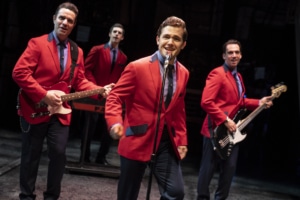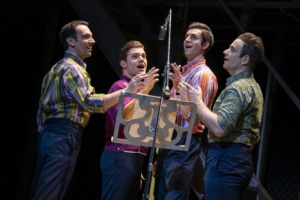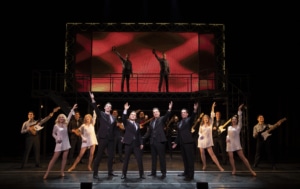DCPA NEWS CENTER
Enjoy the best stories and perspectives from the theatre world today.
Enjoy the best stories and perspectives from the theatre world today.
By: Diane Snyder
Forget about show-stopping finales. In Jersey Boys, the smash-hit musical about the rise and fall of The Four Seasons, the pinnacle of excitement comes about 45 minutes into the first act. That’s when back-to-back presentations of three of the group’s biggest hits — “Sherry,” “Big Girls Don’t Cry” and “Walk Like a Man” — are greeted with enough thunderous applause to start a downpour.

(l to r) Devon Goffman, Eric Chambliss, Jon Hacker and Matt Faucher Photo: Joan Marcus
“At that moment the audience has forgotten they’re watching four actors and they root for these four guys as though they really are The Four Seasons in their youth,” says Rick Elice, one of the show’s book writers. “The response is so sincere and enthusiastic and over the top that it’s impossible to believe anything else.”
It’s also somewhat surprising. After all, The Four Seasons may have been one of the most successful groups of the 1960s, but history hasn’t institutionalized them the way it has The Beatles or other bands popular with that era’s counterculture. But Elice thinks that’s one reason why fans are so hungry for their music and the incredible story of four Italian-American kids from the wrong side of the New Jersey tracks who could just as easily have ended up in prison as on the pop charts.
“In many ways the band was a reflection of the people who were buying their records,” Elice notes. “They didn’t have long hair or accents. There was no glamour quotient to them at all, which is why they were never written about. For fans of the band, the show is an edification of who they are, because the cultural establishment ignored them too. These weren’t the people who went down to Washington and marched against the war; these were the guys who shipped out and went to Vietnam. And the respect that the band is getting all these years later somehow feels like respect for them too.”

(l to r) Jon Hacker, Eric Chambliss, Devon Goffman and Matt Faucher Photo: Joan Marcus
In fact, before working on Jersey Boys, The Four Seasons song that most resonated with Elice (pronounced “Ellis”) was “Can’t Take My Eyes Off You,” because characters in The Deer Hunter sing it just before they go to Vietnam. But he and his Oscar-winning co-author, screenwriter Marshall Brickman (Annie Hall), probably were more familiar with Vivaldi’s Four Seasons than pop music’s when they began work on the show, a first musical for them both. Des McAnuff, on the other hand, the Tony-winning director behind The Who’s Tommy, was a huge fan of the group (the first album he ever bought was a Four Seasons one), and he helped to shape the show from its early stages.
While other musicals have tried to capitalize on a group’s catalog of songs by integrating them into the plot, the writers agreed with McAnuff that their staging should be presentational, as if The Four Seasons were performing the songs to an audience, not singing them from one character to another.
“In the first act the songs are presented pretty much chronologically, as they took place within the life of the band,” explains Elice, who prefers to describe Jersey Boys as a “play with music” instead of employing the much maligned “jukebox musical” moniker. “In the second act the music is more cunningly chosen to reflect either directly or by contrast what the band is going through at the point where things start to fall apart.” As members leave the group one by one, it’s to a medley of “Stay,” “Let’s Hang On (To What We’ve Got),” “Opus 17 (Don’t You Worry ’Bout Me)” and “Bye, Bye, Baby.”

(l to r) Jon Hacker and Eric Chambliss Photo: Joan Marcus
Jersey Boys was born when Elice, for many years the creative director of Broadway advertising agency Serino Coyne, was contacted by a former client who had the option on The Four Seasons catalog. Elice had written a couple of plays and always wanted to work with Brickman, who was a poker buddy. But as they interviewed the three surviving Seasons, they faced a predicament over how to tell the group’s “true” story when they couldn’t even figure out what it was.
Elice and Brickman met with Bob Gaudio and Frankie Valli, the two Seasons who, way back when, formed a business partnership with a handshake. “They started to describe what it was like to be blue-collar kids, first-generation Americans, Roman Catholic, high school dropouts who were flirting with careers in crime in an environment where people had two pictures on the living room wall: the Pope and Frank Sinatra,” Elice recounts. “It was the archetypal American rags-to-riches story: You start with nothing, achieve success and then try to navigate your life through the waters of success.”
But when they contacted Tommy DeVito, the initial driving force behind the group until gambling debts put him on the outs with the mob, “He said, ‘Don’t listen to them, I’ll tell you what really happened,’” Elice recalls. That’s when they decided to structure the show the Rashomon way, by letting each character tell his own account. As Tommy says at the beginning of the show, “You ask four guys, you get four different versions.”

(l to r) Matt Faucher, Jon Hacker, Eric Chambliss and Devon Goffman Photo: Joan Marcus
Each Season narrates a portion of the story, including bass player Nick Massi, who died in 2000 and left the group at the height of its popularity without much explanation. Brickman and Elice drew their portrait of him from the memories of the other survivors. “There was a great mystery to Nick,” Elice says. “Today you would call him obsessive-compulsive with sort of a sideline in sexual addiction. One day we realized the correlative for Nick would be to think of him as the Ringo of the band. In any group there’s going to be someone who’s off to the side.”
That gave them the chance to focus on the Tommy-Frankie-Bob dynamic that first propels The Four Seasons to the top of the charts and eventually breaks them apart. “This was really a love triangle — without any sexual component,” Elice observes. “There was Tommy, who discovered Frankie when he was a teenager and held the trio group of Tommy, Nick and Frankie together when they were a cover band. Then Bob, this new, young talent came on the scene, and Frankie turned away from Tommy and turned toward Bob because Frankie and Bob were simpatico.”

(l to r) Eric Chambliss, Jon Hacker, Devon Goffman, Matt Faucher and the Company of JERSEY BOYS. Photo: Joan Marcus
Valli and Gaudio saw in each other what the group needed to succeed: Gaudio, already a songwriting prodigy when he joined the group, wrote or co-wrote many of the group’s signature songs, which accentuated Valli’s vast vocal range and commanding falsetto. DeVito, meanwhile, piled up a huge debt. But by then the Seasons were more than just a group: They’d become a family, and that put their loyalty to the test. “Tommy gave Frankie and Bob an opportunity to do what families always do,” Elice says. “No matter what kind of betrayals occur you always stand up for another person in the family because the ties that bind are so strong.” DeVito may also have been dealing with his own family issues. As The Four Seasons climbed the charts, his brother, who once had been part of the band, was behind bars.
And for Elice, that’s the essence of the show — family. “That was a very powerful hook,” he says. “We all know what it’s like to want acceptance, to want respect and to try to find a sense of home with people that are not just the family we’re born into but the family that we choose.
Diane Snyder is a freelance journalist whose work has appeared in Time Out New York, The Wall Street Journal and American Theatre.
DETAILS
Jersey Boys
April 15-17 • Buell Theatre
Tickets
